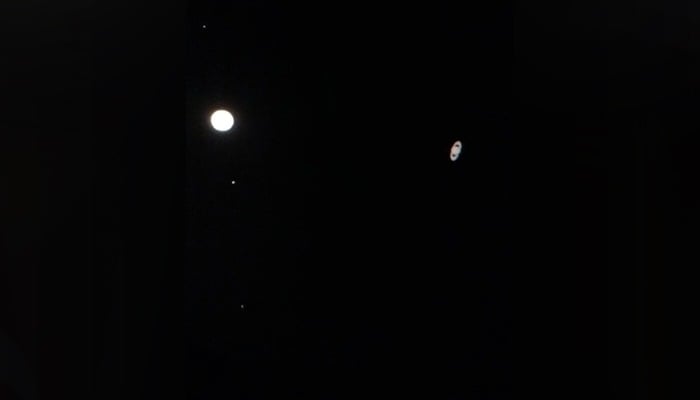KU makes special arrangements for students to observe 'Great Conjunction' of Jupiter and Saturn
The Great Conjunction occurred on Monday evening after 400 years
KARACHI: The University of Karachi's Institute of Space Science and Technology (ISST) on Monday observed the rare phenomenon of Jupiter and Saturn, known as the "Great Conjunction."
For the purpose, the university made special arrangements for sky-watchers and students to observe the rare occurrence at the campus.
According to Geo News, the Director of ISST Professor Dr Jawed Iqbal said that all standard operating procedures (SOPs) of COVID-19 were strictly followed.
"This phenomenon is called the "Great Conjunction," Professor Jawed said. "The last time the two planets passed very close to each other was in 1623, but the view was extremely difficult due to their proximity to the Sun, and this conjunction would be repeated on March 15, 2080."
According to Dr Jawed Iqbal, Jupiter and Saturn are the two largest planets of our solar system. Jupiter, which is about 11 times the size of Earth, is the largest planet, while Saturn is about 9.4 times the size of Earth.
"Jupiter’s distance from the Sun is 778 kilometres, while Saturn’s distance from the Sun is about 1427 million kilometres," he said, adding that Jupiter completes one cycle in about 11.8 years, while Saturn completes one cycle in 29.5 years.
"The distance between them is more or less the same when the two planets are closest to each other at the same time," the professor explained. "When these both planets came closest in the sky and observed in the same direction during the same time, then we call it a conjunction.”
Dr Jawed Iqbal further said that the planets Jupiter and Saturn usually pass close to each other every twenty years, but the junction that occurred on Monday, December 21, 2020, is called the Great Connection because the distance between the two planets was very short.
"It was 733 million kilometres and observed at a distance of 0.1 degrees from the Earth."
-
Security forces gun down 30 terrorists in multiple IBOs in KP: ISPR
-
MQM-P calls for new province in Sindh
-
US report validates Pakistan military edge over India: PM
-
Banned TTP poses serious threat to Pakistan security: UNSC panel
-
CM Afridi clarifies remarks on by-poll after ECP requests army deployment
-
Dubai sees 3.2m Pakistani passengers in 2025 as airport sets new milestone
-
Security forces kill 23 Indian proxy terrorists in KP's Kurram
-
Pakistan to construct island to boost oil exploration: report












